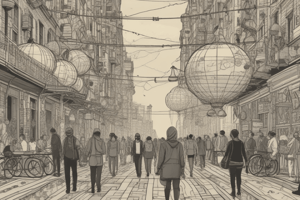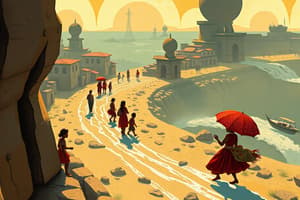Podcast
Questions and Answers
What term describes the movement of people across international borders for the purpose of long-term residence?
What term describes the movement of people across international borders for the purpose of long-term residence?
- International Migration (correct)
- Brain Drain
- Environmental Migration
- Emigration
Which of the following best explains glocalization?
Which of the following best explains glocalization?
- The isolation of local cultures from global influences
- The merging of global culture with local traditions while retaining unique characteristics (correct)
- The imposition of global culture over local culture
- The rejection of global ideas in favor of traditional practices
What is typically used to characterize broadcast media?
What is typically used to characterize broadcast media?
- Communication that pre-records messages for future viewing
- Exclusively online interactive multimedia platforms
- Delivery of written content through newspapers and magazines
- Real-time audiovisual communication via channels like TV and radio (correct)
Which concept involves the loss of skilled workers from a country due to migration?
Which concept involves the loss of skilled workers from a country due to migration?
What is the primary purpose of demographic data collection?
What is the primary purpose of demographic data collection?
Which term refers to the blending of different cultural elements to create something new?
Which term refers to the blending of different cultural elements to create something new?
What best describes mass media?
What best describes mass media?
What is the significance of the Demographic Transition Model (DTM)?
What is the significance of the Demographic Transition Model (DTM)?
What does cultural differentialism emphasize in the context of cultural differences?
What does cultural differentialism emphasize in the context of cultural differences?
What differentiates a tourist from a vagabond?
What differentiates a tourist from a vagabond?
How does media diversity contribute to society?
How does media diversity contribute to society?
In the context of media globalization, what is its main effect?
In the context of media globalization, what is its main effect?
What best describes a global city?
What best describes a global city?
What is the purpose of the Demographic Transition Model (DTM)?
What is the purpose of the Demographic Transition Model (DTM)?
What is a significant characteristic of print media?
What is a significant characteristic of print media?
What role do immigrants play in society?
What role do immigrants play in society?
Flashcards are hidden until you start studying
Study Notes
Undocumented Migrants
- Undocumented migrants lack legal protections, making them vulnerable to exploitation, human trafficking, and discrimination.
Glocalization
- A blend of global and local influences, where local cultures integrate aspects of global culture while maintaining unique characteristics.
Migrant Contributions
- Skilled migrants can drive economic development and innovation in host countries.
Cultural Hybridization
- The merging of different cultural elements to create something new, such as combining various art styles.
Mass Media
- Methods of communication that deliver information, entertainment, or messages to a large audience, examples include TV, radio, newspapers, and online platforms.
Demographic Data Collection
- Primarily gathered through censuses, government records, and surveys.
Broadcast Media
- Characterized by real-time audiovisual communication through channels like TV and radio.
International Migration
- Movement of people across international borders for the purpose of long-term residence.
Media Globalization
- The integration of media worldwide, facilitating a multicultural exchange of ideas.
Pluralism
- A societal structure where political power is shared among multiple groups or entities.
Brain Drain
- The loss of skilled workers from a country, often due to migration for better opportunities.
Importance of Demography
- Helps governments and businesses understand population trends and plan resources.
Emigration
- Leaving one’s country to live in another.
Religion
- A system of beliefs and practices encompassing moral values, rituals, and social structures regarding the divine and life's purpose.
Quran
- The holy book of Islam, containing revelations given to Prophet Muhammad.
Immigrants
- Individuals entering a new country with the intention to reside permanently.
Founder of Buddhism
- Siddhartha Gautama, also known as the Buddha
Differences in Media
- Print media uses tangible materials, broadcast media is real-time, and digital media operates online.
Environmental Migration
- Migration due to natural disasters or environmental changes.
Demographic Changes
- Tracked through statistics on births, deaths, and disease incidence.
Digital Media
- Involves online platforms exclusively, offering interactive and multimedia experiences.
Demographic Transition Model (DTM)
- Focuses on changes in birth and death rates as a country develops economically.
Migration
- Refers to the movement of people from one place to another, typically across borders.
Media Types for Events
- Different media types like print (flyers), broadcast (radio), and digital (social media) can effectively promote events.
Global Media
- Includes platforms that have a worldwide reach, such as social media networks like YouTube and Facebook.
Media Diversity
- Contributes to an inclusive society by providing a voice for marginalized communities and diverse perspectives.
Cultural Differentialism
- Viewing cultural differences as assets to be preserved rather than obstacles.
Media and Development
- Media fosters growth by exposing societies to diverse ideas and systems, enhancing creativity and knowledge exchange.
Global City
- A city with competitive economic advantages and significant influence in the global economy.
Tourist vs. Vagabond
- A tourist is someone who moves for enjoyment, while a vagabond is driven by the appeal of travel.
Digital Era
- Beyond entertainment, digital media serves as a source of knowledge and a platform for communication and interaction.
Purpose of DTM
- Predicts population growth based on economic development stages.
Population Growth in DTM
- Population growth generally decreases as countries become economically developed.
Language and Culture
- Encouraging language learning promotes cultural understanding and appreciation for diversity.
Immigrant Contributions
- Immigrant communities add cultural diversity and contribute to the labor force.
Trinity in Christianity
- The Christian belief in God as Father, Son, and Holy Spirit.
Global City Features
- According to Saskia Sassen, global cities offer economic opportunities and are competitive.
Demography
- The statistical study of human populations, including size, structure, and distribution.
Refugees
- People fleeing their country to escape conflict, persecution, or danger.
Telegraphy
- Uses Morse code and electrical pulses to transmit messages, historically important in long-distance communication.
Major World Religions
- Christianity and Islam are the two most widely practiced religions globally.
Print Media
- Refers to physical formats like newspapers and magazines for distributing content.
Studying That Suits You
Use AI to generate personalized quizzes and flashcards to suit your learning preferences.




